Naturally Relieve Anxiety at Home: Effective Self-Care Practices
This article is for informational purposes only and has been reviewed by licensed pharmacists. Always consult with a healthcare professional before starting any medication.
Introduction
Anxiety can be a burden that affects both physical and mental well-being. Managing anxiety naturally at home is not only possible but can be profoundly empowering. Through a blend of lifestyle adjustments and natural remedies, it is possible to achieve a state of calm and relaxation. This article explores various non-pharmaceutical methods to alleviate anxiety, focusing on holistic self-care practices that foster a serene and balanced life.
Self-Care Strategies for Naturally Relieving Anxiety
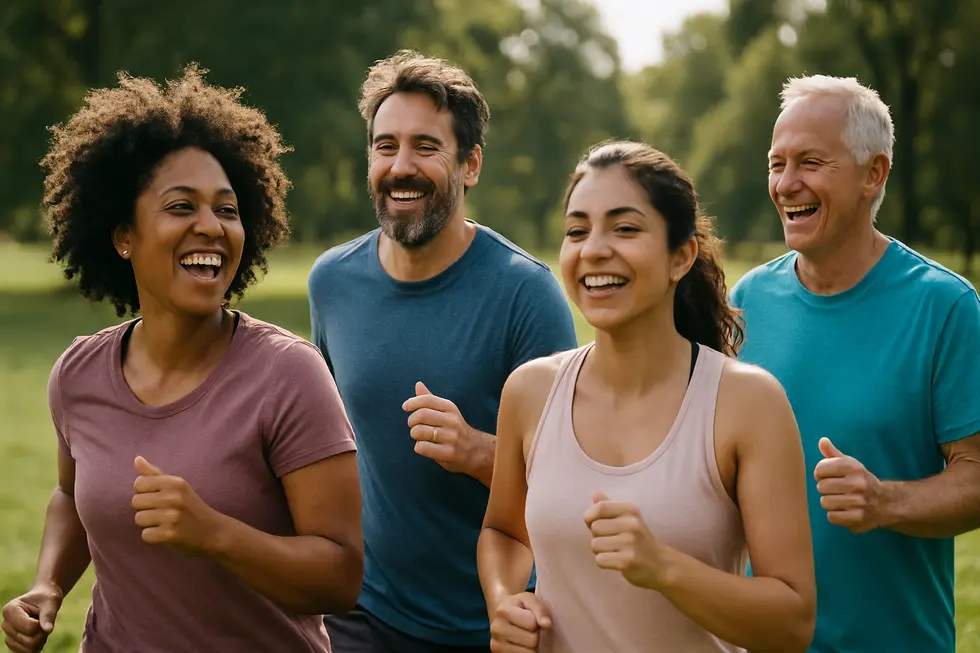
1. Harnessing Physical Activity to Alleviate Anxiety
Regular exercise has repeatedly proven to be an effective tool in reducing anxiety, offering a wealth of benefits that reach beyond the physical. By engaging in consistent physical activities, individuals can experience profound improvements in mental well-being, courtesy of the body’s innate chemical responses. Exercise promotes the release of endorphins, often referred to as ‘feel-good’ hormones, which contribute significantly to enhancing mood and providing relief from stress and anxiety.
Furthermore, regular physical activity can improve sleep quality, which is crucial for mental health. Inadequate sleep can exacerbate anxiety symptoms, and exercise helps regulate sleep patterns, promoting deeper and more restful slumbers. As per NHS recommendations, adults should aim for at least 150 minutes of moderate-intensity exercise each week, a goal that can be achieved through activities such as brisk walking, cycling, or swimming.
In addition to endorphin release, exercise acts as a natural distraction, allowing individuals to break free from the cycle of negative thoughts that often accompany anxiety. This mental shift is crucial in developing a more balanced perspective on everyday stressors and challenges. Importantly, while exercise is greatly beneficial, it is not a stand-alone cure. Those experiencing severe anxiety should seek guidance from a healthcare provider to explore comprehensive treatment options. Ultimately, integrating regular physical activity into one’s lifestyle forms a cornerstone of a holistic approach to managing anxiety at home.
2. Harnessing the Power of Exercise for Natural Anxiety Relief
Regular physical activity can be a transformative approach to managing anxiety at home without medication. Engaging in exercise not only fosters physical health but also plays a critical role in mental well-being. Exercise triggers the release of endorphins, the body’s natural mood lifters, which can diminish symptoms of anxiety and depression. Furthermore, regular physical activity can enhance sleep quality, boost self-esteem, and improve cognitive function.
The flexibility in exercise choices allows individuals to select activities that align with their personal interests and physical capabilities, making it easier to integrate into daily life. Whether it’s the rhythmic cadence of jogging, the focus and balance of yoga, or the community and fun of team sports, each form offers distinct benefits that contribute to alleviating anxiety. For example, yoga is renowned for its emphasis on mindful movement and breathing, which can significantly reduce tension and stress. Similarly, aerobic exercises like running or cycling increase heart rates and promote greater oxygen intake, which can lead to more substantial mental clarity and reduced anxiety levels over time.
According to NHS guidelines, aiming for at least 150 minutes of moderate-intensity aerobic activity every week, alongside muscle-strengthening exercises on two or more days, is recommended for optimal health benefits. However, consult your pharmacist or healthcare provider for personalised advice, especially if you have underlying health conditions or are new to exercise. This multifaceted approach ensures that exercise remains an enjoyable and pivotal aspect of your anxiety-relief toolkit.
For further understanding of treatment options available for anxiety, visit this guide.
Holistic Self-Care Approaches for Anxiety Relief At Home
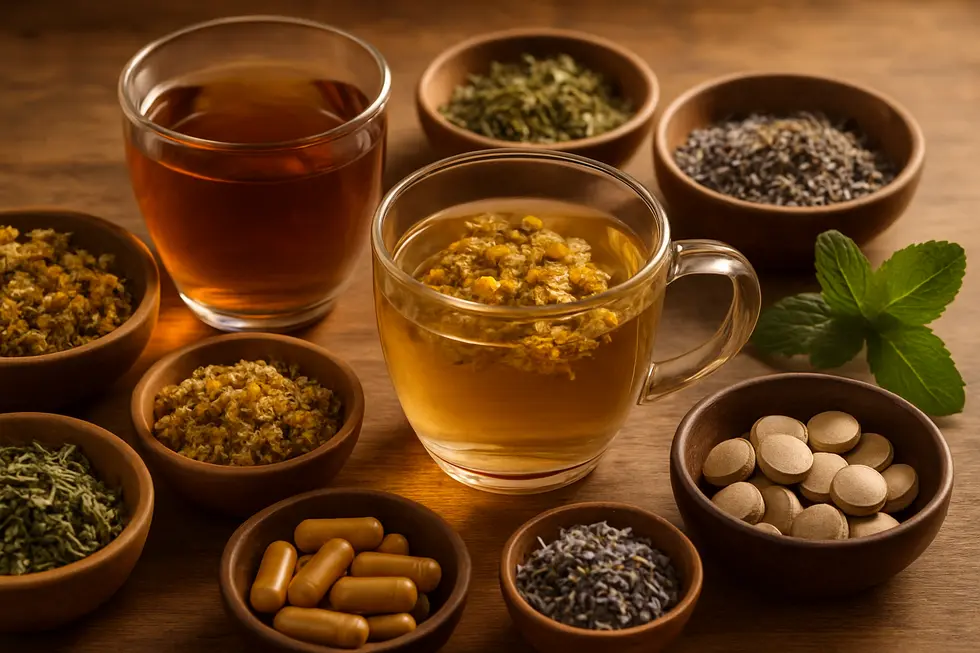
1. Herbal Allies: Exploring Nature’s Anxiety Relievers
Harnessing the healing power of herbs offers a natural pathway to alleviate anxiety symptoms without medication. Lavender (Lavandula angustifolia) stands as a potent ally in calming nervous tension, often used in aromatherapy to promote relaxation. Its soothing properties may help create a peaceful ambience, ideal for unwinding after a hectic day.
Chamomile (Matricaria chamomilla), a well-known tranquilliser, is frequently consumed as a tea to alleviate stress and promote relaxation before sleep. Similarly, Lemon Balm (Melissa officinalis) is believed to enhance mood and cognitive function, making it a popular choice for those seeking mental clarity and reduced stress levels.
Passionflower (Passiflora incarnata) has a long-standing tradition in herbal medicine for its anxiolytic and sedative effects. While it is commonly recommended for those experiencing anxiety-related insomnia, Valerian Root (Valeriana officinalis) is another herb often chosen to improve sleep quality and provide anxiety relief through its gentle, calming effects.
Adaptogens like Ashwagandha (Withania somnifera) offer remarkable benefits by helping the body adapt to stress while balancing physiological processes. Rhodiola (Rhodiola rosea) similarly aids in enhancing mood and boosting energy levels. When considering herbal remedies, consulting a healthcare provider is crucial to ensure there are no interactions with existing medications and to discuss suitable options during pregnancy or breastfeeding.
For a deeper dive into natural anxiety treatments, feel free to explore alternative therapies in managing generalised anxiety disorder.
2. Herbal Allies in Alleviating Anxiety Naturally
Herbal remedies have long been revered for their calming effects and ability to ease symptoms of anxiety. Among these, chamomile stands out for its mild tranquillising effects. Frequently enjoyed as a tea, chamomile is not only soothing but can also aid in improving sleep quality—though if pregnant, it’s best to consult your pharmacist before indulging. Another herb, lavender, is popular for its use in aromatherapy. A few drops of lavender essential oil in a diffuser can create a calming atmosphere in your home.
Passionflower and lemon balm are other notable herbs that offer promise. Passionflower, available as an extract, has been suggested by some studies to reduce symptoms of anxiety and improve sleep when used cautiously. Lemon balm, used in teas or capsules, is known for its mood-stabilising properties. However, like with any supplement, it is essential to approach with care, and seeking advice from a healthcare provider is recommended if you are on medication.
The role of ashwagandha cannot be overlooked. Known for its adaptogenic properties, it helps the body manage stress. Available in various forms, it supports a balanced response to anxiety when used as part of a routine. Lastly, kava, though potent in reducing anxiety, requires careful administration due to potential liver toxicity. According to NICE guidelines, caution is warranted with these herbal supplements due to varying evidence quality. Thus, always consult a healthcare provider or your pharmacist before integrating any herbal remedy into your routine. For more on managing anxiety effectively, consider exploring Generalised Anxiety Disorder Treatment.
Self-Care Routines to Relieve Anxiety at Home Without Medication
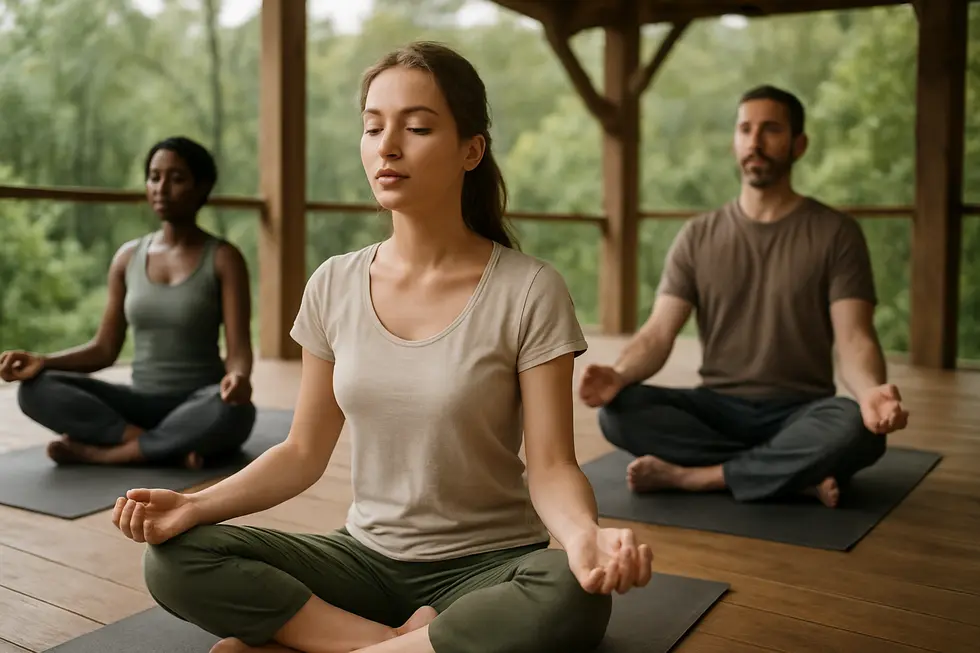
1. The Art of Meditation and Mindful Breathing for Enhanced Calm
Meditation and mindful breathing are powerful tools in managing anxiety without resorting to medication. Rooted in ancient practices, they provide a sanctuary for the mind amidst the chaos of modern life. Unlike transient distractions, such as scrolling through social media, these techniques cultivate a profound mindfulness that encourages a tranquil state of awareness and peace.
By setting aside just a few moments each day, individuals can employ meditation to distance themselves from the pressures and demands of external influences. Starting with simple breathing exercises can lay the foundation for deeper practices. For instance, the 4-7-8 breathing technique involves inhaling for four seconds, holding the breath for seven, and exhaling for eight—promoting a relaxed state beneficial for reducing anxiety.
A variety of free resources are available, from guided meditations on apps to videos on mindfulness channels, offering structured paths into these practices. The NHS recognises meditation as having positive effects on overall mental health, reinforcing its credibility as a viable self-care strategy. Users are encouraged to seek medical advice if they experience discomfort during these practices, particularly if they have pre-existing conditions that might be exacerbated.
Those wishing to delve deeper might explore community workshops or online courses, which can offer a supportive environment. Embracing meditation and mindful breathing not only reduces anxiety but fosters resilience against future stressors, aligning with holistic self-care approaches. For further understanding of anxiety management, you may wish to explore generalised anxiety disorder treatment in the UK.
2. The Tranquil Synergy of Yoga and Guided Imagery
Incorporating yoga and guided imagery into your daily routine is an effective way to cultivate calm and manage anxiety at home without the need for medication. Yoga, an ancient practice that combines physical postures, breath control, and meditation, offers profound benefits for mental and physical well-being. By employing specific asanas (physical postures) like Child’s Pose or Legs-Up-the-Wall, individuals can release muscle tension and improve circulation, which aids in reducing anxiety symptoms.
Breathing exercises, or pranayama, are central to yoga’s effectiveness in mitigating stress. Techniques such as Nadi Shodhana (Alternate Nostril Breathing) help harmonise the mind by balancing the brain’s hemispheres and calming the nervous system through parasympathetic activation. Additionally, integrating mindful meditation into yoga encourages a focus on the present moment, diminishing the mind’s wandering towards anxious thoughts.
Guided imagery, a complementary relaxation technique, enhances these benefits by inviting you to visualise serene scenes or experiences. By imagining a tranquil seaside or peaceful forest, you can replace stress-inducing thoughts with images of calm. Used during yoga’s final relaxation pose, Savasana, guided imagery solidifies the relaxation achieved through practice, grounding the body and mind in a state of rest.
Combining these practices fosters a holistic environment of awareness and relaxation, making it a sustainable strategy for anxiety relief. To maximise these advantages, consistently integrate yoga and guided imagery into your life. This approach encourages lasting resilience against stress and elevates overall emotional health. For further insight into managing anxiety naturally, visit the NHS website.
Nurturing Calm: Self-Care Routines for Anxiety-Free Living at Home
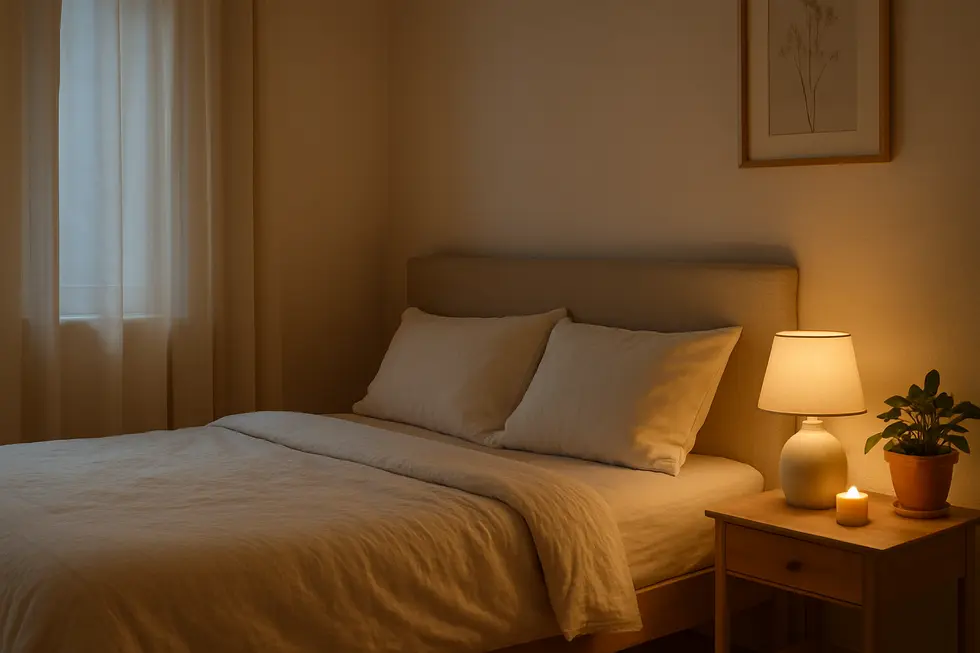
1. The Crucial Role of Sleep Hygiene in Alleviating Anxiety
Sleep is a cornerstone of mental well-being and plays a pivotal role in managing anxiety at home. Effective sleep hygiene isn’t merely about clocking sufficient hours of rest; it is about creating a consistent bedtime routine that optimises the quality of sleep, thereby fostering a state of calm and resilience against anxiety.
Prioritising consistent sleep patterns helps in aligning one’s circadian rhythm, which according to NHS guidelines is essential for mental and physical health. Establishing a habitual sleep schedule—going to bed and waking up at the same time each day—enhances the body’s natural sleep-wake cycle, making it easier to fall asleep and wake up refreshed.
The environment where you sleep heavily influences your ability to rest well. A room that is cool, quiet, and dark, free from distractions such as electronic gadgets, encourages relaxation before bedtime. Engaging in activities like reading a book or practising gentle yoga can naturally ease the body into a restful state.
Additionally, mindful consumption—aiding sleep with a warm drink such as caffeine-free herbal tea—further enhances relaxation. However, it’s crucial to monitor these habits and consult your pharmacist when including supplements or herbal aids to ensure there are no contraindications with any other medication or conditions.
By integrating these elements into your nightly routine, you set a solid foundation not only for quality sleep but also for robust day-to-day mental health, effectively reducing anxiety naturally.
2. Sleep Hygiene: A Shield Against Anxiety
In today’s world, the importance of quality sleep as an ally in combating anxiety cannot be overstated. Sleep hygiene, a term encompassing various practices that facilitate restorative sleep, is pivotal in reducing anxiety. According to NICE guidelines, maintaining a regular sleep schedule, ensuring a restful environment, and avoiding stimulants like caffeine close to bedtime are key components of effective sleep hygiene.
During sleep, the brain processes emotions and restores mental functions; inadequate or poor-quality sleep can exacerbate anxiety symptoms. As per NHS recommendations, adults should aim for 7-9 hours of sleep per night. Adopting good sleep hygiene not only supports mental health but also enhances physical well-being. Simple adjustments, such as making your bedroom a tranquil space free from possible distractions, can significantly improve sleep quality.
Moreover, practising relaxation techniques before bed, such as mindful breathing or guided imagery, helps prepare the body for sleep, promoting a smoother transition to rest. It’s crucial to address anxiety symptoms holistically, integrating routines that naturally support relaxation and resilience. If persistent sleep issues occur, seeking medical advice is advisable, particularly when symptoms interfere with daily life.
For those interested in alternative sleep aids when sleep hygiene adjustments are insufficient, it’s insightful to explore further comparisons in resources like Zopiclone vs Melatonin: Which Sleep Aid?.
Addressing sleep hygiene is a foundational step in fostering an anxious-free slumber, paving the way to improved mental health and quality of life.
Self-Care Routines to Alleviate Anxiety Naturally at Home
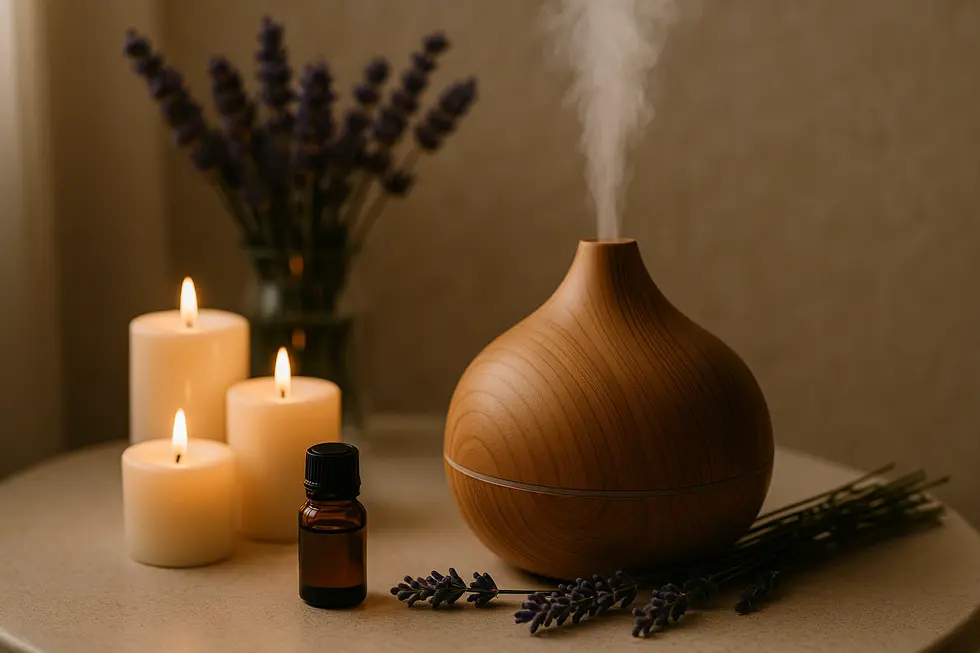
1. Harnessing Essential Oils for Tranquillity and Calm
Essential oils have long been cherished for their powerful aromatic properties, offering a simple yet effective means to reduce anxiety at home. Among these, lavender stands out due to its calming effects, which are well-documented in various studies. Its soothing scent can ease tension, promoting a more relaxed state of mind by influencing the limbic system, the brain’s centre for emotions. Chamomile is another popular choice, well-known for its gentle calming properties, making it perfect for those seeking a soft embrace of tranquillity in their daily routine.
In addition to lavender and chamomile, bergamot is frequently praised for its ability to uplift and impart a sense of wellbeing. A few drops of bergamot oil in a diffuser can transform your space into a serene sanctuary, fostering a positive environment. When using essential oils, safety should always be paramount. According to NHS guidelines, essential oils should be diluted before coming into contact with skin to prevent irritation.
It’s important to remember that while essential oils can complement an anxiety management strategy, they are not a cure and should not replace professional care. Consult your pharmacist or healthcare provider, particularly if you are pregnant, breastfeeding, or have existing health conditions, to ensure safe usage. For a more comprehensive understanding of anxiety treatments and holistic approaches, visit this guide to anxiety treatment in the UK.
2. The Lush Scent of Serenity: Essential Oils for Anxiety Relief
Harnessing the power of essential oils can be a transformative addition to your self-care routine, helping to alleviate anxiety naturally in the comfort of your home. Aromatherapy, the use of essential oils for emotional and physical wellbeing, taps into the profound connection between scent and the brain, specifically the limbic system, which governs emotions.
Of all the essential oils available, lavender stands out for its calming effects. It is known to decrease anxiety and improve mood by promoting relaxation and reducing stress hormones. Similarly, lemon balm holds promise for easing anxious feelings, often employed for its soothing and stabilising properties.
To maximise their benefits, essential oils can be used in a variety of ways: adding a few drops to a diffuser can disperse the aroma throughout your space, creating a calming environment. Alternatively, a relaxing bath with diluted oils can serve as a therapeutic retreat. When opting for topical applications, always ensure oils are diluted with a carrier oil to prevent skin irritation.
While essential oils are a natural option, it is crucial to exercise caution. Consult your pharmacist, as some oils can interact with medications or may not be suitable during pregnancy or for young children. Incorporating these soothing scents into your self-care routine can significantly contribute to a tranquil home atmosphere, enabling you to manage anxiety effectively. For further insights into managing anxiety, refer to this detailed guide.
Final Thoughts
Managing anxiety without medication is achievable through integrated self-care approaches that cultivate relaxation and mental fortitude. By incorporating regular exercise, meditation, herbal supplements, aromatherapy, and vital lifestyle changes, individuals can significantly enhance their quality of life. These holistic strategies work together to support a state of tranquillity and resilience, empowering you to manage anxiety naturally while consulting a healthcare provider for personalised advice as needed.
Save time and money with our online pharmacy. Same medicines as your high street pharmacy, better prices, delivered to your door.
About Us
We’re the UK’s modern online pharmacy making healthcare simple. From prescriptions to health advice, we provide everything you need to manage your health from home. Fast delivery, great prices, real pharmacists. Order from Quick Meds UK today.
Need Professional Advice?
Our licensed pharmacists are available for consultations
Book a Consultation